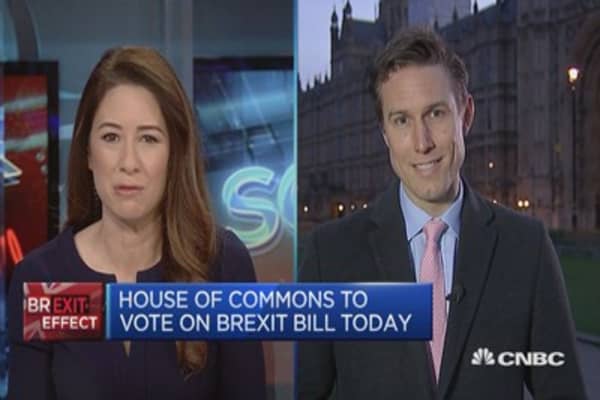<!– –>
Complex talks to prepare the U.K.’s departure from the European Union could begin this week with lawmakers expected to finish debating a bill that would give Prime Minister Theresa May permission to formally start the Brexit process.
The government has previously stated that May would trigger Article 50 by the end of the month, but a so-called Brexit bill could complete its final stages if both Houses of Parliament on Monday, leading to speculation that the formal announcement could be made as early as Tuesday.
Once this happens, London and Brussels have only two years to negotiate how the U.K. is leaving the bloc and what their future relationship will be. Lawmakers have told CNBC they are concerned that the two years will not be enough to agree on all the details.
“We’ve got something like 14 months (to negotiate),” Seb Dance, a Labour member of the European Parliament, told CNBC last week via telephone
Apart from the complex technicalities that the process involves, the slew of elections in key member states this year could derail Brexit given that these countries will likely prefer to spend their time focused on their domestic battles.
“France and Germany will be focused on domestic policies and it’s not a very popular message ‘I’m going to give concessions to the U.K.,'” Dance added.
Above all, it seems that Brexit isn’t starting on the best footing. There have been reports that the European Commission – which negotiates on behalf of the other 27 countries – wants the U.K. to pay a 60 billion euro ($63.64 billion) bill to leave the bloc.
The money is expected to be used to pay for the pensions of U.K. citizens who work in the European institutions, for the relocation costs of certain European authorities out of London, and for projects in the U.K. that have already seen funding approved by the EU. However, some U.K. lawmakers have said there’s no way the U.K. will pay such an exit bill.
There are also divergent views between Brussels and London on how the negotiations should take place: The European Commission wants to discuss how the U.K. will leave the EU and then how they can work together in the future, but Theresa May wants both points to be discussed in parallel.
Furthermore, it seems that European officials are still in disbelief regarding the U.K.’s decision. President Jean-Claude Juncker of the European Commission said last week that he believes the U.K. will rejoin the EU in the future.
Sterling vulnerable?
The British pound edged higher Monday morning, trading 0.4 percent higher against the dollar at $1.221. However, currency experts believe sterling is going to be volatile when negotiations kick off.
“We are viewing sterling as a very vulnerable currency going into the start of Brexit. Very crucial will be the tone of the EU at the commencement of the negotiations. Any confirmation that the EU will take a hard line and/or further indications that the start of trade talks will be delayed until the end of the year are likely to be most worrisome for the pound,” Jane Foley, senior forex strategist at Rabobank, told CNBC via email.
“We see EUR/GBP reaching 0.89 in the second half of the year, with upside risk to the forecast,” she added.
The U.K. cannot sign any new trade deals before it formally exits the EU. However, Steven Ciobo, minister for trade, tourism and investment in Australia, told CNBC on Monday that his country has had “constructive preliminary discussions” with the U.K. for a free trade agreement once it leaves the EU.
Other countries, including New Zealand, are waiting to work with the U.K. on a new trade deal. But the question some economists raise is whether the new deals will be able to compensate for the impact of leaving the EU’s single market – the free trade zone area that allows European businesses to sell and buy in other EU countries.
Scotland wants second referendum
Nicola Sturgeon, Scotland’s first minister, said on Monday the country will start proceedings for a second Scottish referendum on independence.
“What Scotland deserves is the chance to decide our future in a fair, free and democratic way and a time when we are equipped with the facts we need,” she said.
Scotland could hold such vote in the fall of 2018. The U.K. government has until 2019 to leave the EU.
Scotland voted significantly in favor of remaining in the EU. Its independence vote would add further concern on the stability of the U.K. and the stability of the U.K. government itself during Brexit negotiations.

UK poised to trigger Brexit this week — Here’s what you need to know – CNBC




